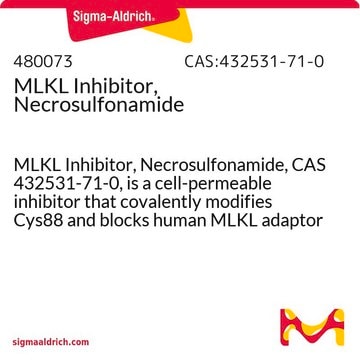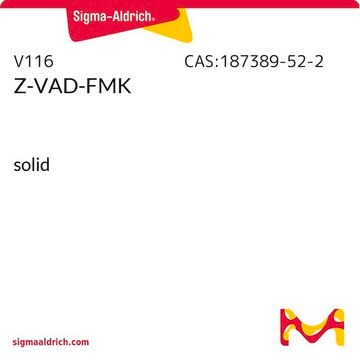SML2001
GSK′843
≥98% (HPLC)
Synonym(s):
3-(5-Benzothiazolyl)-7-(1,3-dimethyl-1H-pyrazol-5-yl)-thieno[3,2-c]pyridin-4-amine, GSK 843, GSK-843, GSK843
Sign Into View Organizational & Contract Pricing
All Photos(1)
About This Item
Empirical Formula (Hill Notation):
C19H15N5S2
CAS Number:
Molecular Weight:
377.49
MDL number:
UNSPSC Code:
12352200
NACRES:
NA.77
Recommended Products
Assay
≥98% (HPLC)
form
powder
color
white to beige
solubility
DMSO: 2 mg/mL, clear
storage temp.
2-8°C
SMILES string
[s]1c2c(nc1)cc(cc2)c3c4c([s]c3)c(cnc4N)c5[n](nc(c5)C)C
Biochem/physiol Actions
GSK′843 is a potent ATP-competitive RIP3 (RIPK3) kinase inhibitor (IC50 = 6.5 nM) with much reduced or little affinity toward 262 other kinases (IC50 >1 μM against 10 μM ATP in competitive binding assay), including RIP5. GSK′843 effectively suppresses TNF/Z-VAD-FMK/IAP agonist treatment-induced necrosis induction in both human and murine cell cultures (EC50 ranges from <0.12 to 3 μM), while inducing apoptosis in the absence of caspase inhibitor as a result of caspase 8 activation via RHIM-driven recruitment to assemble a Casp8-FADD-cFLIP complex independent of pronecrotic kinase activities and MLKL.
Storage Class Code
11 - Combustible Solids
WGK
WGK 3
Flash Point(F)
Not applicable
Flash Point(C)
Not applicable
Choose from one of the most recent versions:
Certificates of Analysis (COA)
Lot/Batch Number
Sorry, we don't have COAs for this product available online at this time.
If you need assistance, please contact Customer Support.
Already Own This Product?
Find documentation for the products that you have recently purchased in the Document Library.
Pratyusha Mandal et al.
Molecular cell, 56(4), 481-495 (2014-12-03)
Receptor-interacting protein kinase 3 (RIP3 or RIPK3) has emerged as a central player in necroptosis and a potential target to control inflammatory disease. Here, three selective small-molecule compounds are shown to inhibit RIP3 kinase-dependent necroptosis, although their therapeutic value is
William J Kaiser et al.
The Journal of biological chemistry, 288(43), 31268-31279 (2013-09-11)
Toll-like receptor (TLR) signaling is triggered by pathogen-associated molecular patterns that mediate well established cytokine-driven pathways, activating NF-κB together with IRF3/IRF7. In addition, TLR3 drives caspase 8-regulated programmed cell death pathways reminiscent of TNF family death receptor signaling. We find
N Preyat et al.
Cell death and differentiation, 23(1), 29-40 (2015-05-23)
Cellular necrosis has long been regarded as an incidental and uncontrolled form of cell death. However, a regulated form of cell death termed necroptosis has been identified recently. Necroptosis can be induced by extracellular cytokines, pathogens and several pharmacological compounds
Our team of scientists has experience in all areas of research including Life Science, Material Science, Chemical Synthesis, Chromatography, Analytical and many others.
Contact Technical Service








